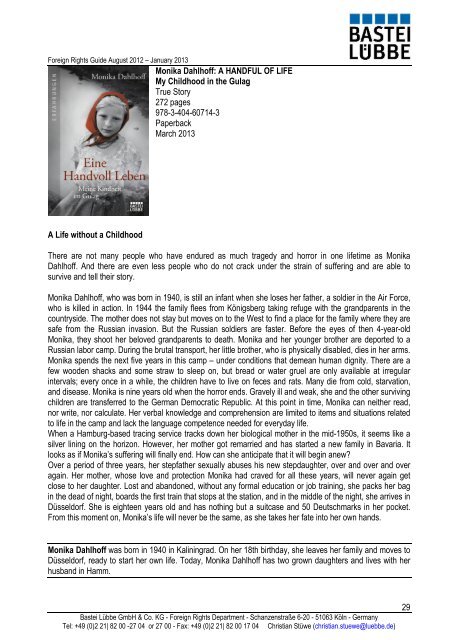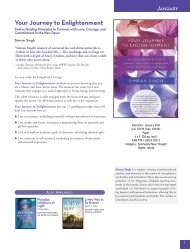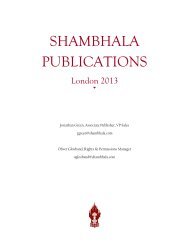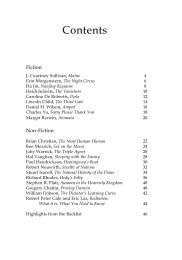Foreign Rights Catalogue - ANTHEA
Foreign Rights Catalogue - ANTHEA
Foreign Rights Catalogue - ANTHEA
You also want an ePaper? Increase the reach of your titles
YUMPU automatically turns print PDFs into web optimized ePapers that Google loves.
<strong>Foreign</strong> <strong>Rights</strong> Guide August 2012 – January 2013<br />
A Life without a Childhood<br />
Monika Dahlhoff: A HANDFUL OF LIFE<br />
My Childhood in the Gulag<br />
True Story<br />
272 pages<br />
978-3-404-60714-3<br />
Paperback<br />
March 2013<br />
There are not many people who have endured as much tragedy and horror in one lifetime as Monika<br />
Dahlhoff. And there are even less people who do not crack under the strain of suffering and are able to<br />
survive and tell their story.<br />
Monika Dahlhoff, who was born in 1940, is still an infant when she loses her father, a soldier in the Air Force,<br />
who is killed in action. In 1944 the family flees from Königsberg taking refuge with the grandparents in the<br />
countryside. The mother does not stay but moves on to the West to find a place for the family where they are<br />
safe from the Russian invasion. But the Russian soldiers are faster. Before the eyes of then 4-year-old<br />
Monika, they shoot her beloved grandparents to death. Monika and her younger brother are deported to a<br />
Russian labor camp. During the brutal transport, her little brother, who is physically disabled, dies in her arms.<br />
Monika spends the next five years in this camp – under conditions that demean human dignity. There are a<br />
few wooden shacks and some straw to sleep on, but bread or water gruel are only available at irregular<br />
intervals; every once in a while, the children have to live on feces and rats. Many die from cold, starvation,<br />
and disease. Monika is nine years old when the horror ends. Gravely ill and weak, she and the other surviving<br />
children are transferred to the German Democratic Republic. At this point in time, Monika can neither read,<br />
nor write, nor calculate. Her verbal knowledge and comprehension are limited to items and situations related<br />
to life in the camp and lack the language competence needed for everyday life.<br />
When a Hamburg-based tracing service tracks down her biological mother in the mid-1950s, it seems like a<br />
silver lining on the horizon. However, her mother got remarried and has started a new family in Bavaria. It<br />
looks as if Monika’s suffering will finally end. How can she anticipate that it will begin anew?<br />
Over a period of three years, her stepfather sexually abuses his new stepdaughter, over and over and over<br />
again. Her mother, whose love and protection Monika had craved for all these years, will never again get<br />
close to her daughter. Lost and abandoned, without any formal education or job training, she packs her bag<br />
in the dead of night, boards the first train that stops at the station, and in the middle of the night, she arrives in<br />
Düsseldorf. She is eighteen years old and has nothing but a suitcase and 50 Deutschmarks in her pocket.<br />
From this moment on, Monika’s life will never be the same, as she takes her fate into her own hands.<br />
Monika Dahlhoff was born in 1940 in Kaliningrad. On her 18th birthday, she leaves her family and moves to<br />
Düsseldorf, ready to start her own life. Today, Monika Dahlhoff has two grown daughters and lives with her<br />
husband in Hamm.<br />
Bastei Lübbe GmbH & Co. KG - <strong>Foreign</strong> <strong>Rights</strong> Department - Schanzenstraße 6-20 - 51063 Köln - Germany<br />
Tel: +49 (0)2 21| 82 00 -27 04 or 27 00 - Fax: +49 (0)2 21| 82 00 17 04 Christian Stüwe (christian.stuewe@luebbe.de)<br />
29






